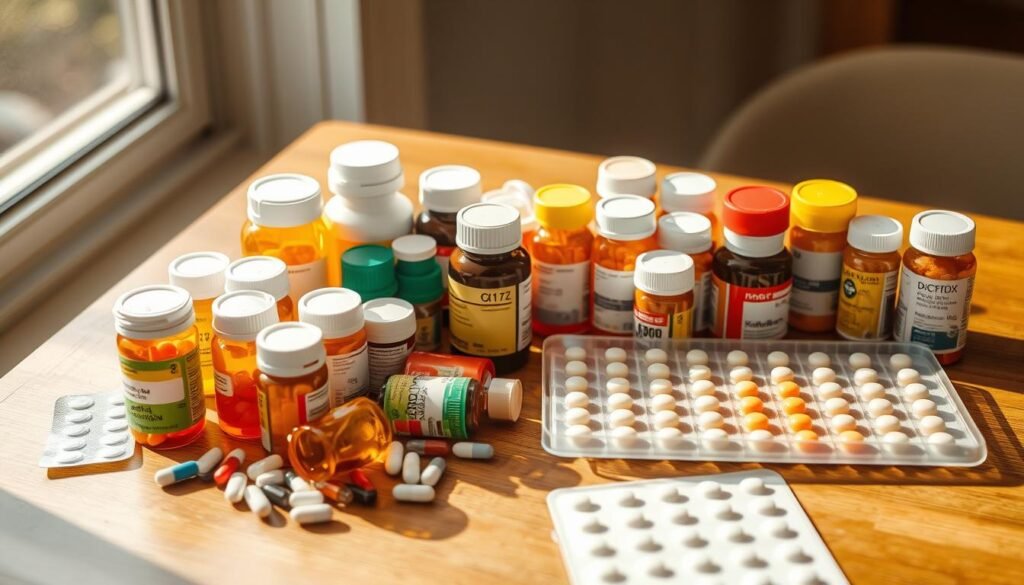Did you know many side effects from statins stem from the “nocebo effect”? This means our minds deeply influence how we feel after taking medication. It’s clear that prescription drugs have a big impact, and learning to manage side effects is key.
Medications are vital for treating illnesses, but their side effects can hurt our quality of life. People with conditions like diabetes or high blood pressure often take many drugs. This can increase the chance of unwanted effects. So, managing these effects is more than just taking medication. It’s about dealing with issues that come up.
Knowing how to ease drug side effects can help patients control their health. Learning about common reactions and talking openly with doctors is essential. This article will teach you ways to handle these effects and feel better overall.
Key Takeaways
- Understanding the psychological aspects, including the nocebo effect, can help patients cope with side effects.
- Communication with healthcare providers is vital for effective medication side effect management.
- Recognizing that side effects can vary and may dissipate after a few days is important for patient reassurance.
- Maintaining an updated list of all medications and supplements can prevent dangerous interactions.
- Patients should actively inquire about potential side effects and interactions before starting new medications.
Understanding Medication Side Effects
Medication side effects are common but often not well understood. They can vary greatly in severity. Understanding them can make patients more aware and encourage talks with doctors.
Common Side Effects of Prescription Drugs
Many people have side effects from medications. These can include:
- Upset stomach
- Dizziness, especially with meds like those for blood pressure and depression
- Drowsiness and dry mouth
- Significant weight gain
- Changes in sleep or sexual desire
These side effects show why it’s crucial to know about them. Some may need to try different meds or doses to find what’s best.
Why Side Effects Occur
Side effects happen for many reasons. The body often needs time to adjust. This adjustment can be influenced by:
- How drugs interact in the body
- Possible bad reactions between different meds
- Personal factors like age, health, and supplement use
There are ways to lessen side effects, such as when to take meds or dose changes. Being aware and prepared can greatly improve treatment.
| Common Side Effects | Medications Associated | Potential Consequences |
|---|---|---|
| Dizziness | Antidepressants, Muscle Relaxants | Falls, Increased Risk of Injury |
| Weight Gain | Certain Diabetes Medications | Impact on Quality of Life |
| Sleep Disruption | Blood Pressure Medications | Fatigue, Impaired Daily Functioning |
| Dry Mouth | Various OTC and Prescription Drugs | Difficulty Eating, Increased Risk of Cavities |
How to Manage Medication Side Effects
Managing medication side effects means being proactive. This includes talking openly and knowing what might cause discomfort. People should work closely with their healthcare providers. This helps handle medicine intolerance and fix any new issues. Working together like this ensures every part of treatment is covered well.
Importance of Communication with Healthcare Providers
Talking openly with healthcare providers is key to managing side effects well. Patients need to share their experiences and any bad reactions freely. This can make managing medicine much better by:
- Identifying side effects that may need changes in dose or different treatments.
- Using comprehensive medication therapy management (MTM) programs. These can help find ways to reduce side effects and save money.
- Making sure all medicines, including those you buy without a prescription and supplements, are discussed. This prevents unsafe drug interactions.
Identifying the Sources of Side Effects
Knowing where side effects come from is critical. Factors that lead to these effects include:
- Drug Interactions: Some medicines can change how others work or create harmful combinations.
- Food Interactions: Certain foods, like grapefruit juice, can change how medicines work and increase side effects.
- Dosage Errors: Wrong doses can cause bad reactions, either from too much or too little.
- Individual Reactions: Age, genetics, and overall health play a big role in how someone reacts to a medicine.
Being proactive in understanding these factors leads to better following of medication schedules and better health overall. Knowing about withdrawal symptoms helps avoid stopping medicines too soon. This keeps the treatment working and prevents problems.
Recognizing Serious Side Effects
Knowing the difference between mild and serious side effects is crucial. Many meds come with risks. It’s vital to spot the bad ones quickly. Being aware of certain signals is key. This means you can get help fast and reduce harm.
When to Contact Your Doctor
If you notice any of these, call a doctor:
- Difficulty breathing or shortness of breath
- Severe skin rashes or reactions
- Persistent nausea or vomiting
- Signs of a severe allergic reaction, such as swelling or hives
- Unexplained lethargy or fatigue
Patients, especially the elderly, need to be careful. Over 60% of older COVID-19 patients take many meds. This can raise the chances of bad side effects.
Signs of Severe Adverse Reactions
Bad reactions can show up in different ways. Spotting them early is crucial. Look out for these signs:
| Symptom | Description |
|---|---|
| Chest pain | May indicate cardiovascular issues related to medications. |
| High fever | Can signal an adverse reaction or infection. |
| Severe headaches | Could be a sign of a reaction within the nervous system. |
| Unusual bleeding or bruising | Might suggest hematopoietic system involvement. |
Being informed and talking well with your doctor adds to safety. Always note down any odd symptoms. Getting advice on how to handle your can help avoid issues and improve your health.
Medication Side Effect Management Strategies
It’s key to manage medication side effects well to stay healthy and safe. By using smart steps, you can keep an eye on how meds affect you. This helps avoid unwanted reactions. Two top tips are keeping a diary of your meds and using pill organizers.
Keeping a Medication Diary
A medication diary helps track side effects and how well meds work. You can jot down the dose, when you take it, and any side effects. This makes it easier to talk about meds with doctors. A diary helps in these ways:
- It spots patterns in side effects.
- It gives doctors accurate info for better care.
- It shows which meds might need changes.
Utilizing Pill Organizers
Pill organizers help manage lots of meds safely. They keep you from missing doses, which is great for people with many prescriptions. Pill organizers make taking meds more reliable. They make everyone’s life easier. Here are their benefits:
- They make taking meds daily simpler.
- They clear up confusion about when to take meds.
- They help patients take charge of their health.

| Strategy | Benefits | Considerations |
|---|---|---|
| Keeping a Medication Diary | Tracks side effects, improves communication, identifies patterns | Requires consistent entries to maintain accuracy |
| Utilizing Pill Organizers | Reduces missed doses, simplifies routine, encourages adherence | Must be refilled regularly to be effective |
Alleviating Prescription Drug Side Effects
Dealing with medication side effects can be tough. But certain lifestyle changes can really help. Adjusting diet, staying hydrated, and using supplements can improve health and reduce discomfort.
Dietary Changes to Minimize Side Effects
It’s important to think about what you eat. Some foods can cause more side effects or make your medicine work less well. Foods like grapefruits and certain dairy products might not mix well with your meds.
Eating foods that are nutritious and low in preservatives is a good idea. Keeping a food diary helps identify bad reactions related to your medicines.
The Role of Hydration
Being well-hydrated is key to feeling good. Drinking plenty of water helps with constipation and nausea, which are common with many drugs. Water helps your body handle medicine better and reduces bad effects.
Supplements and Natural Remedies
Supplements and natural remedies might ease side effects. Omega-3 fatty acids, for example, help with mental health. They can lessen side effects like fatigue and mood swings from antidepressants.
However, talk to your doctor before trying new supplements. They can tell you what’s safe to mix with your prescriptions.
If you’re taking several medicines, talking to a pharmacist about how to manage them is wise. Being organized and communicating with your health team helps you stay healthy. For more tips, check out help for managing multiple medications.
Managing Multiple Medications Safely
Handling many medications can be tough. This is especially true for people on five or more drugs, known as polypharmacy. The CDC found many older adults, in their 60s and 70s, must deal with this daily. Such a mix increases the chance of drug issues and negative effects.
Consulting with a Pharmacist
It’s crucial to manage meds well to avoid harmful interactions and side effects. A pharmacist’s guidance is key. They can do thorough reviews of your meds and spot possible negative mixings. These might cause confusion, dizziness, or rashes.
Have a complete, up-to-date list of all your medications, including prescriptions, over-the-counter drugs, vitamins, and herbal supplements. This helps in talking with your doctors. Seeing a pharmacist for a full review at least once a year is a good idea. It can greatly cut down polypharmacy risks.
Using pill organizers and reminders can help you stick to your med schedule safely. Realizing the value of a pharmacist’s advice lets people take charge of their health. This way, they can handle many medications without worry.

Effective management strategies for medication side can also help those facing these challenges.
Dealing with Drug Adverse Reactions
Dealing with drug adverse reactions means being alert and knowing about your medicines. Up to 30% of hospital admissions in the U.S. are due to these reactions. It’s vital to understand how your medications can interact with each other.
This understanding helps handle the side effects from taking multiple medicines. Those interactions might increase the chance of adverse reactions. So, knowing your prescriptions’ interactions is key.
Understanding Drug Interactions
When you’re on more than one medication, the potential for harmful interactions goes up. Some medicines, like antibiotics and blood thinners, often have adverse reactions. Recognizing risky medications helps manage your treatment safely.
To avoid troubles, watch closely and learn about the ways drugs affect each other. This knowledge is critical for your safety and the effectiveness of your drugs.
Assessing your Current Medication List
It’s crucial to regularly check your medicine list with healthcare experts. Always bring your list of medicines to your appointments. Doing so makes it easier to talk about possible risks.
Knowing about drug interactions helps you identify side effects. Keep an accurate list and discuss it with your pharmacist or doctor to stay safe and follow your treatment correctly. For more information on handling drug adverse reactions, visit medication management strategies.
Coping with Pharmaceutical Side Effects
Pharmaceutical treatments bring important benefits. But, side effects can make things hard for many people. Knowing and handling these effects is key to feeling better and sticking with treatments. People, doctors, and pharmacists need to work together to deal with these effects.
Adjusting Dosages Safely
Making safe changes to medication is crucial. Never change your dosage without talking to a professional. It’s important to talk openly with your doctor about any bad reactions. Sometimes, side effects might go away as your body gets used to the medicine. Your doctor might lower your dose or suggest a different drug. Trying to adjust your medication on your own can be risky.
The Importance of Following Prescriptions
Sticking to your prescription ensures your medication works well. Not following directions can lead to worse side effects or less benefit. Doctors can help spot side effects and adjust your medication as needed. Following your doctor’s orders is good for both your physical and mental health. Useful tools, like tips for managing side effects, are out there. Always be ready to get help if you notice any bad effects.

| Medication Category | Common Side Effects | Management Strategies |
|---|---|---|
| Antidepressants | Dizziness, drowsiness, changes in libido | Consult healthcare provider about dosage adjustments |
| Blood Pressure Medications | Dizziness, fatigue | Monitor blood pressure regularly; consider lifestyle changes |
| Chemotherapy Drugs | Nausea, fatigue, body image changes | Discuss nausea management with a doctor; explore supportive therapies |
| Statins | Muscle pain, digestive issues | Evaluate the possibility of using alternative medications |
| Diabetes Medications | Weight gain, gastrointestinal issues | Seek dietary advice from a healthcare provider |
Minimizing Medication Side Effects
It’s crucial to know when to take your meds to keep side effects low. Right ways to give meds can cut down bad reactions and make treatment work better. Think about these tips.
Timing and Administration Techniques
Picking the best time for meds can greatly lower side effects. For example, some medicines are best taken with food to avoid stomach issues. These problems are common with many prescriptions. Also, changing when you take meds can help with dizziness or sleepiness.
- Taking medications with meals helps with absorption and shields the stomach, reducing upset or nausea.
- Taking meds at consistent times daily keeps blood levels stable.
- Talk to doctors about the best administration techniques for your meds, like taking them in the morning or at night.
These habits can make you less likely to have side effects while making your treatment work better. Knowing how meds react with food and other things can also help you manage your meds well. Always talk to your doctor about side effects or changes in how you feel. This helps tailor your treatment plan.
| Medication Type | Common Side Effects | Recommended Administration Techniques |
|---|---|---|
| Antidepressants | Dizziness, weight gain, sleep disturbances | Take in the morning with food |
| Blood Pressure Medications | Dizziness, fatigue | Administer at night to lessen daytime drowsiness |
| Diabetes Medications | Nausea, diarrhea | Consume with meals for better tolerance |
Every med needs special care with its timing and how you take it. Figuring these out can make treatment work better and lower side effects.
Conclusion
Handling side effects well makes patients feel better and helps them get healthier. We’ve talked about how to do this. It includes talking well with doctors, watching side effects closely, and making good lifestyle choices. These steps can really ease the trouble caused by bad reactions to drugs.
A lot of people, about 69.6%, say they’ve had side effects from medicines. Due to these problems, 57.5% stopped taking their drugs. This shows us we need to be active in dealing with medicine side effects. Reading Patient Information Leaflets (PILs) and talking to General Practitioners (GPs) are good ways to understand and handle these issues.
To wrap up, managing side effects properly means safer and more effective treatment. It also gives people the power to take control of their health. Thanks to technology and patient-centered care, we can improve our health care. This leads to patients who are healthier, happier, and more involved in their care.